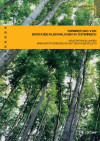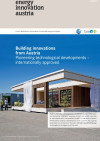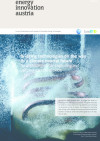Suchergebnisse für "Factsheet: Energietechnologien gestalten, die für alle sinnvoll und nutzbar sind"
GREeNvaluation - Real-time monitoring and performance evaluation
The aim of the project was the development of the GREeNvaluation toolkit, as a precursor to the implementation of green and liveable cities. The visualization and accounting (cost / benefit) of green infrastructure services makes the benefits more tangible and understandable. The GREeNvaluation toolkit aims to create awareness far beyond the target areas by means of target group-specific communication formats.
Biotope City - construction manual for the green city of the future
"Biotope City" is an overall concept for the implementation of comprehensive urban greening with the aim of using the regenerative mechanisms of nature. With this approach, quality of life is to be comprehensively, sustainably and cost-effectively increased and resilience against extreme weather events in cities will be improved. The project aims to generate realistic components of a "construction manual" for the green city of the future, which are generalizable and transferable.
OPENing Re-Use – Optimal planning decisions in the re-use sector
In an operational context, companies in the circular economy are faced daily with the question of whether a used product should be repaired, remanufactured, refurbished or recycled. The decision on what to do with used products is fraught with a great deal of uncertainty and must be made on a case-by-case basis - product-individually and depending on factors such as brand, condition, age, demand or recycling possibilities. As part of the "OPENing Re-Use" project, a business planning tool is being developed to support companies in their re-use planning, thereby increasing the efficiency of re-use processes and making re-use activities even more competitive with the purchase of new products.
StraTex ‐ Sorting and processing strategies for used textiles to produce recyclable fractions
In StraTex, suitable, economically viable and holistic strategies for the collection, processing and automated sorting of mixed non‐reusable textiles are being developed and experimentally implemented in order to increase the proportion of marketable fractions for high‐quality material recycling (preferably fibre2fibre).
Gründerzeit with future - demonstration project 1: David´s Corner
High value energy efficient refurbishment of an ensemble of three neighbouring Wilhelminian style buildings in a non-lucrative location.
CombiSol: solar combisystems for houses, state-of-the-art and potentials for improvements
Evaluation of the quality and efficiency of state-of-the-art installed solar combisystems, potentials for improvements and measures to increase the quality
Development of modular parts for clay-passive houses

Development of extensive storey-high modular parts made of renewable primary products (wood, straw, hemp) for clay-passive houses.
Vilipa - Visible light based Person and Group Detection in existing buildings
Evaluation of the technical and economic feasibility of an occupancy detection system based on the technology of visible light sensing, which, in combination with the building management system, should reduce the energy consumption of buildings. The goal is to implement low-tech/low-complexity solutions that can distinguish between individuals and groups based solely on the detection of visible light reflections.
IEA FBC Implementing Agreement Fluidized Bed Conversion (working period 2009 - 2013)
Overview of the current status of the fluidized bed technology worldwide in regards to energy technology.
IEA PVPS Task 12: Photovoltaics (PV) Sustainability Activities (working period 2024 - 2027)
Photovoltaics (PV) is a renewable energy source that is an important technology for the energy transition. For this reason, or rather despite this, it is important to consider sustainability aspects in PV as well. End-of-life solutions in particular play an important role, as a strong increase in the number of end-of-life modules is expected in the coming years. Well-functioning recycling methods, repair possibilities or reuse options are of great importance. In this project, these existing methods and capacities in Austria are being researched and published in reports and workshops.
ESSBAR – Edible balcony gardens for retrofit – Vertical Greening Technologies for the City
Demonstration of an affordable, resource-saving and innovative balcony system with integrated edible vertical gardens and rainwater management. Considering the needs of residents for green outdoor spaces and the active participation of residents are an important part of the project.
Verbreitung Von Biomasse Kleinanlagen In Österreich

Neue Entwicklungen Brennstoffversorgung mit Biomasse-Pellets
Forschungsforum
3/1998
Herausgeber: BMVIT
Deutsch, 6 Seiten
Downloads zur Publikation
Building innovations from Austria

Pioneering technological developments – internationally approved
energy innovation austria
1/2017
Herausgeber: BMVIT und Klima- und Energiefonds
Englisch, 8 Seiten
Downloads zur Publikation
ZERMET - Zero Emission Retrofitting For Existing Textile Plants
Minimisation of the consumption of water, chemicals and energy in the textile industry. Further development of the ZERMEG approach in the form of a questionnaire and application in the textile industry.
CELL4LIFE - Reversible SOCs as a link between electricity, heat and gas networks to increase the self-sufficiency and resilience of neighbourhoods
A system consisting of a solid oxide fuel cell and a Machine Learning-based control system for increasing efficiency and minimizing degradation is being developed. As a link between all energy supply networks, the system is intended to increase the self-sufficiency and resilience of plus-energy districts.
Bridging technologies on the way to a climate neutral future

New strategies for capturing and utilizing carbon dioxide
energy innovation austria
4/2017
Herausgeber: BMVIT und Klima- und Energiefonds
Englisch, 8 Seiten
Downloads zur Publikation
ProKlim+ - Use of Model Predictive Control to optimize solar power consumption in case of increased energy efficiency.
Using weather forecast for building automation can help improving the energy efficiency of buildings and, thus, saving energy. In the project ProKlim+ the forecast of solar radiation will be used to optimize the building automation to satisfy the needs of the building users, and at the same time to minimize the energy demand on the one hand and to maximize the consumption of self-produced energy on the other hand.
Solar Adsorption cooling system of residential and office buildings (SunSorber)

In the on hand project an adsorber/desorber for a solar operated/district heating operated one-level adsorption chiller with water as cooling agent and silica gel as adsorbent agent will be planned for a low range of performance (2 to 50 kW refrigerating capacity). It will be implemented as a test-/pilot plant. Hence these two substances are an alternative to the HFCKW´s cooling agents that are used nowadays.
Innovative regulation of thermal solar collectors
Research and development of the possibility of a "sensorless" regulation for thermal solar systems
Renewable Biopolymers as Substitution for Bulk Plastics
Biopolymers consist of renewable resources. The concept deals with the development and implementation of technologies in the sector of renewable biodegradable materials.
